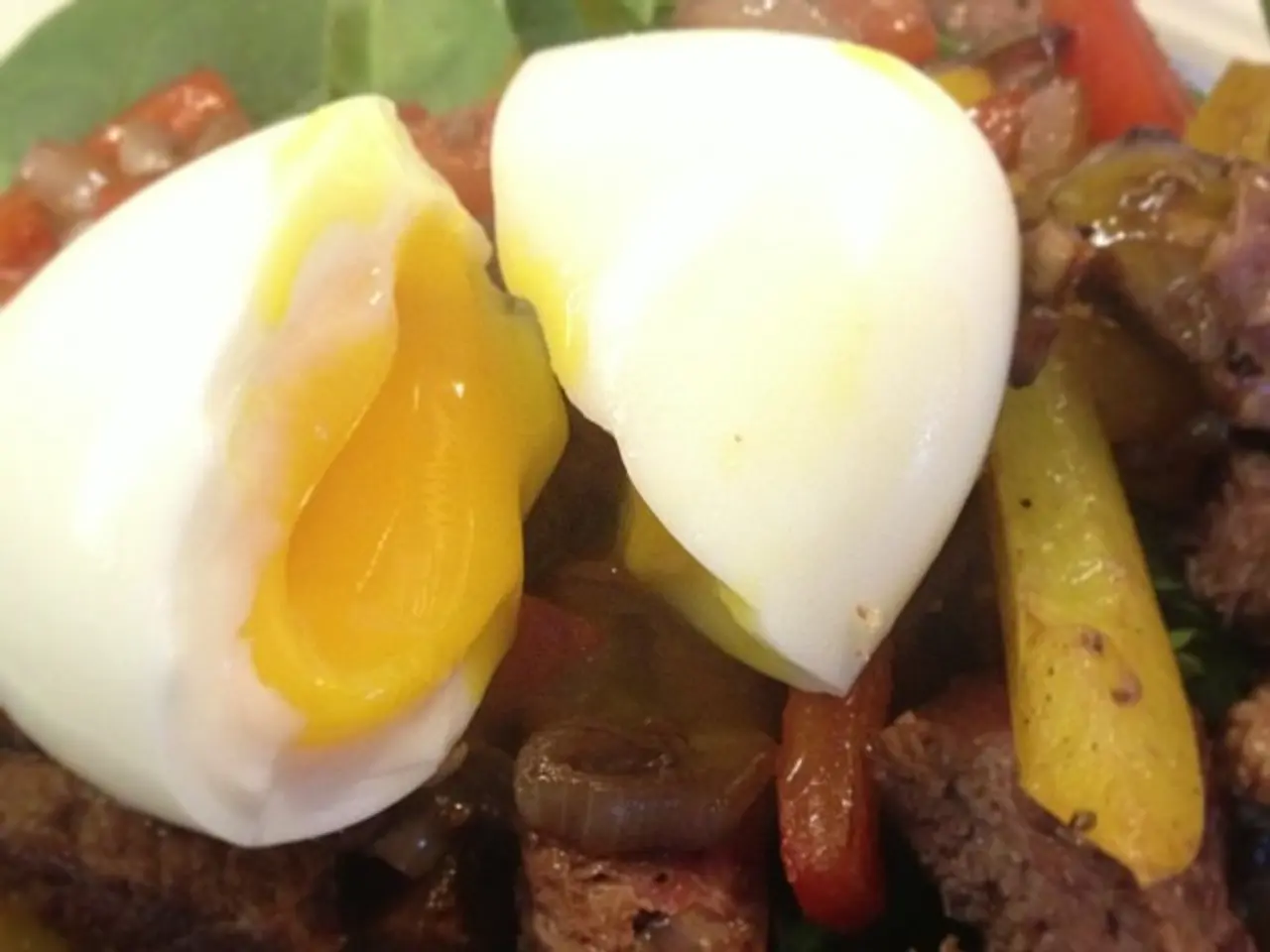Dog Consumption of Eggs: Details on Raw, Cooked, and Shell Consumption
Dogs can safely consume cooked eggs as they offer several nutritional benefits, but it's essential to consider their specific dietary needs before incorporating them into their regular meals.
Eggs are nutritionally dense, providing dogs with proteins, essential amino acids, vitamins, and fats. Cooking eggs (boiling, poaching, or scrambling without added oil, salt, or spices) eliminates the risk of salmonella and destroys avidin, an enzyme in raw eggs that interferes with the absorption of biotin [1][3][4].
Cooked eggs are a valuable source of biologically available protein, which helps maintain muscle mass and overall health. Egg yolks, containing fats and cholesterol, are generally well-tolerated by dogs, but they should be given in moderation, especially for dogs prone to pancreatitis or lipid disorders [1][5].
However, it's important to note that eggs are high in fat and cholesterol, so they should be fed sparingly. Feeding too large of a portion could unbalance a dog's diet or lead to unwanted weight gain. The universal recommendation is to avoid feeding more than 10 percent of a dog's diet from treats, snacks, and scraps [6].
Moreover, dogs with health conditions such as pancreatitis or high blood fat should not eat hard-boiled eggs. It's always a good idea to consult a veterinarian or a specialist veterinary nutritionist for tailored dietary recommendations to fit your dog's needs [2].
One common misconception is that deviled eggs should not be given to dogs due to the added mayonnaise, which increases the fat content. However, plain boiled or scrambled eggs without any additives can be offered to dogs as part of a balanced diet [7].
In conclusion, cooked eggs can be a safe, nutritious treat or supplement to a dog’s diet, offering proteins, vitamins (like biotin), and amino acids. Always remember to consult with a veterinarian before making significant changes to your dog's diet and to monitor portion sizes to prevent excess calorie intake [1][3][4][5].
References: [1] PetMD. (2021). Can Dogs Eat Eggs? https://www.petmd.com/dog/nutrition/can-dogs-eat-eggs [2] ASPCA. (2021). Eggs. https://www.aspca.org/pet-care/virtual-pet-behaviorist/dog-advice/can-i-feed-my-dog-eggs [3] VCA Hospitals. (2021). Can Dogs Eat Eggs? https://vcahospitals.com/know-your-pet/can-dogs-eat-eggs [4] Hill's Pet Nutrition. (2021). The Role of Biotin in Dog Nutrition. https://www.hillspet.com/dog-care/nutrition/the-role-of-biotin-in-dog-nutrition [5] Merck Veterinary Manual. (2021). Pancreatitis in Dogs. https://www.merckvetmanual.com/dog-owners/digestive-disorders-of-dogs/pancreatitis-in-dogs [6] American Kennel Club. (2021). Feeding Your Dog: Treats, Snacks, and Scraps. https://www.akc.org/expert-advice/nutrition/feeding-your-dog-treats-snacks-and-scraps/ [7] Dog Food Advisor. (2021). Can Dogs Eat Deviled Eggs? https://www.dogfoodadvisor.com/dog-food-calculator/can-dogs-eat-deviled-eggs/
Pets, such as dogs, can benefit from the nutritional content of eggs, including proteins, essential amino acids, vitamins, and fats. When incorporated into a dog's lifestyle, home-and-garden tips advise cooking eggs to eliminate the risk of salmonella and destroy avidin, thus ensuring a safer and more balanced diet for dogs' health.




